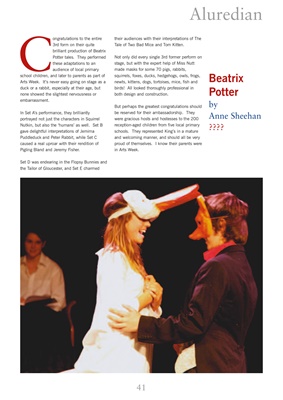
The
Crucible
by
Amy HiggsT
he recent production of The
Crucible was the first ever
student-led production at
King's. Sophie Hewitt, with
the help of Mrs Butler,
successfully directed Arthur
Miller's intense play, and it featured a number
of deeply emotional and realistic performances
by students from across all year groups.
This dramatic play is based on the lives of real
people from the 1600s who were falsely accused
of witchcraft and consequently hung for denying
the courts a bogus confession. It is a play based
on a web of lies and allegations that have been
born out of fear, and its complexity results in
confusion between the on-stage characters as to
who to trust and what to believe. This
atmosphere of bewilderment and suspense was
effectively created and caused the audience to sit
on the edge of their seats throughout!
Simon Baker led the production with a moving
portrayal of John Proctor, a farmer who
committed adultery with his servant Abigail
Williams, played by Victoria Canning. These
two characters have given into one another's
temptation, and the risky nature of their
passionate relationship based on lust was
successfully portrayed during their secret
liaisons. In contrast, the relationship between
Lucy Thomas, in the role of Elizabeth Proctor,
and her husband John managed to evoke
sentiments of affection and love underlying
their clear problems based on trust.
A striking performance came from Sophie
Clifford as the Proctors' newly appointed
servant, Mary Warren, although this character
is falsely accused of witchcraft, causing her
station at the Proctors' household and her
relationship with her employers to be
jeopardised. However, Sophie skilfully
managed to add a humorous note to these
complicated and solemn occurrences.
Although the major roles were
filled by sixth form members of
the school, essential supporting
roles were cast to the lower
years. Special skill was shown
by Max Spreckley, Sam
Matthews and Greg Albery who
had to learn new roles within a
matter of days. Oscar Harding's
amusing representation of a
drunken guard added another
subtle touch of humour to this
dark and complex play.
Numerous third form girls
played the 'village girls' and
they were especially effective in
what was perhaps the most
memorable scene in the court
house. Abigail and the village
girls are brought in to testify to
Mary Warren's claims with
regard to what has happened. Tension was
built up within the scene as Abigail's haunting
words were repeated and echoed by the girls'.
Again, this climax was full of suspense and
evoked fear within the audience.
The play came to a striking end, illustrating the
results of the Salem witchcraft trials with the
use of spotlights to symbolise the hangings of
three innocent characters, including John
Proctor himself. All in all, Sophie managed to
show considerable dramatic ability as well as
directing skill through this impressive piece of
drama which certainly held the attention of the
audience throughout. The entire cast made
dedicated and remarkable performances which
were backed up by realistic costumes and
effective work backstage to create yet another
extraordinary and memorable King's production.
Aluredian
40